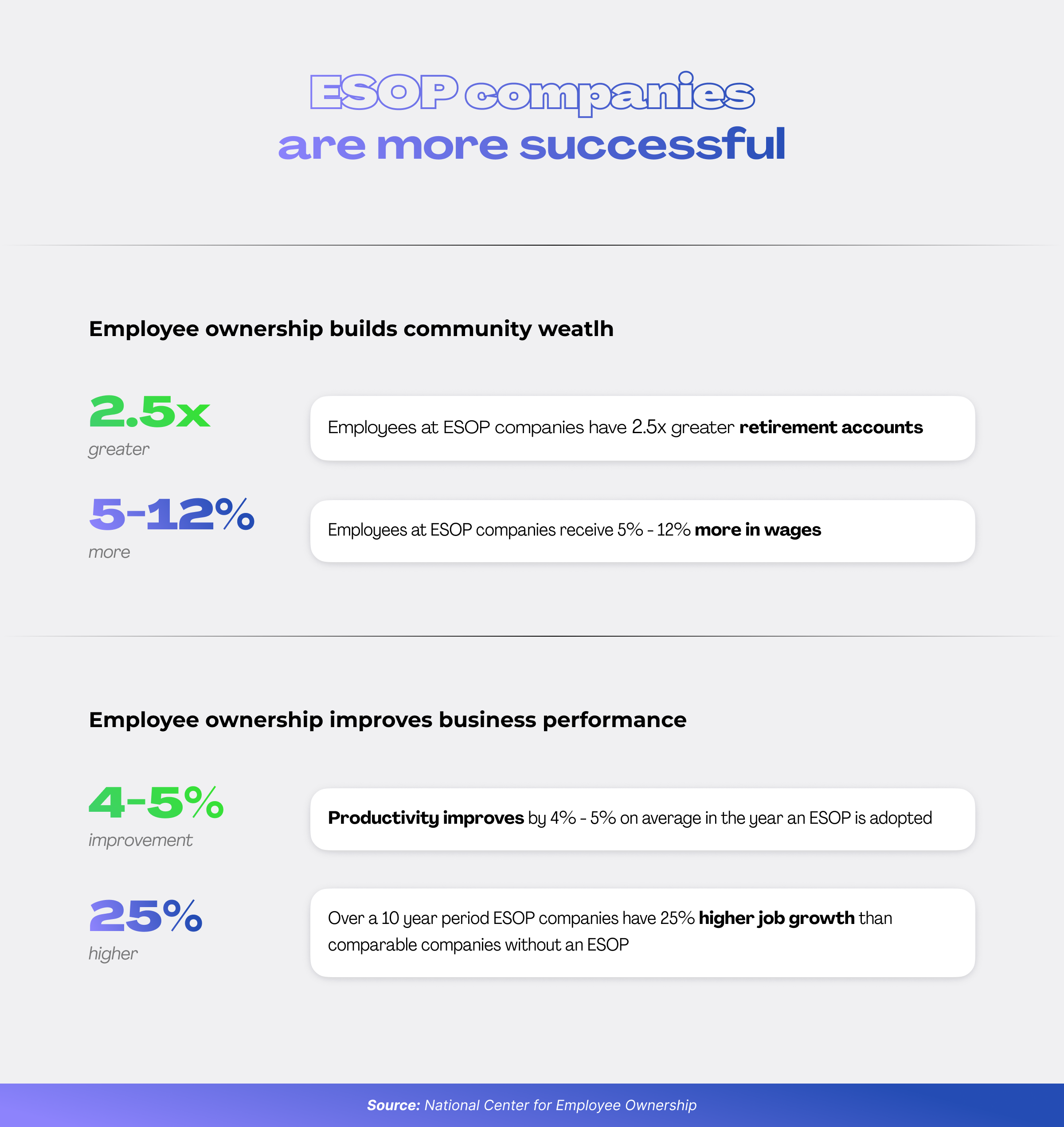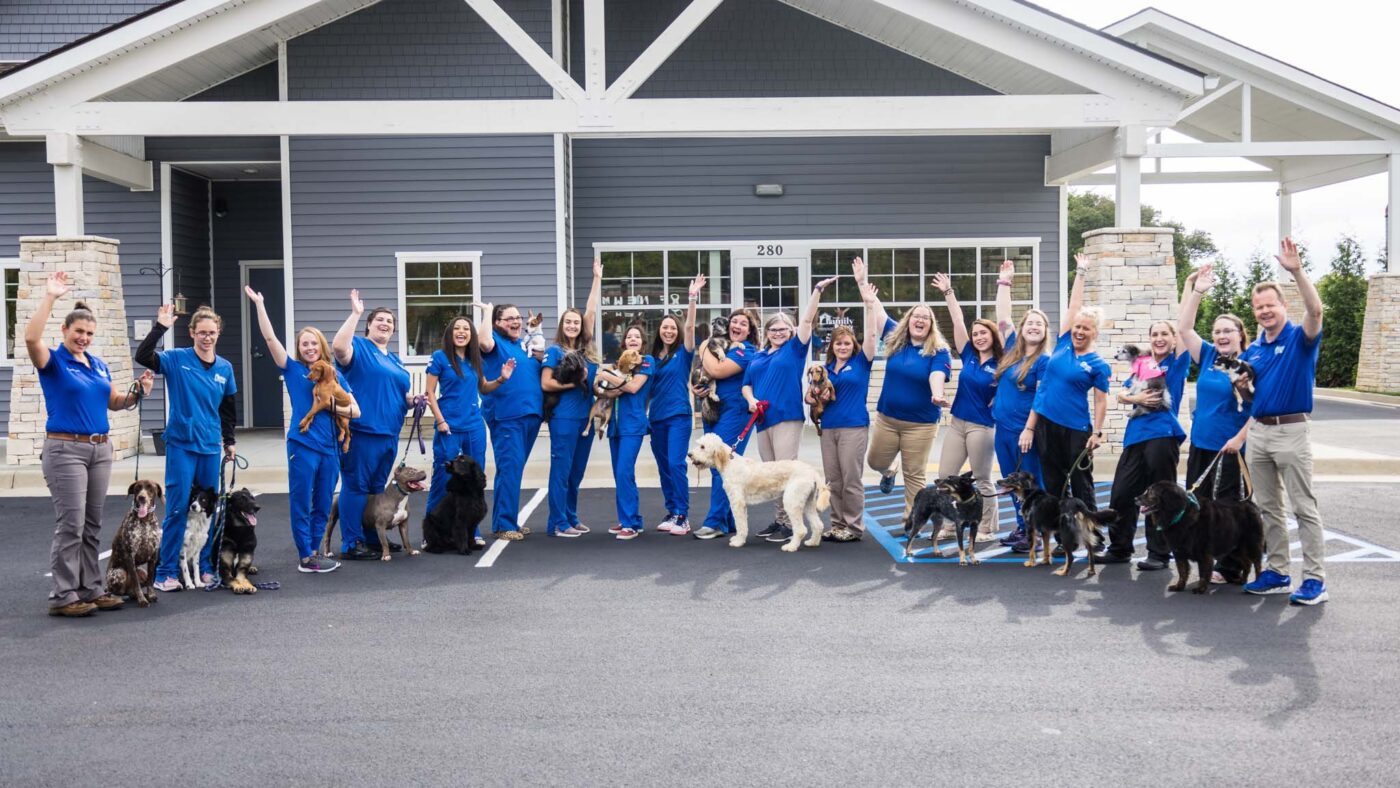Galaxy Vets is a company of owners. We are proud that every employee is a shareholder and benefits from our success. Founded and run by vets, we created Galaxy Vets as an employee-owned company because we understand the profession’s challenges — we have experienced them ourselves. Our vision is to make the veterinary industry better for our colleagues and the animals in their care. We feel that giving employees a stake in the company gives veterinary medicine back to veterinarians.
At Galaxy Vets, we believe that wealth should be more widely distributed across the industry. Working in the veterinary field is difficult, and veterinary teams deserve better compensation for their hard work. They also deserve to share in the gains. Employee ownership better distributes wealth across the industry, offers more freedom and choice, and fortifies retirement outcomes for the veterinary teams. Since our employees have company ownership, they are naturally passionate about our organization, deeply committed to our success, and feel a substantial personal stake in the organization’s performance. Keep reading to learn more about our model and how our team members benefit.
Employee Stock Ownership Plan
An employee stock ownership plan (ESOP) is a benefit where employees can have an ownership interest in the company in the form of shares of stock. The first ESOP was created by Louis Kelso, a San Francisco lawyer and economist, in 1956, as a way to transition ownership of Peninsula Newspapers, Inc. from the founders to the chosen successors, managers, and employees. Kelso advocated passionately for these plans, and founded Kelso & Co. to help other businesses establish ESOPs. In 1974, Congress enacted the Employee Retirement Income Security Act (ERISA), which protects employee retirement program participants and formally established ESOPs as a retirement plan. Today, employee ownership is a very common element of the U.S. economy, and ESOPs are considered the most successful form of employee ownership.
The economic power of ESOPs

ESOPs are extremely successful in other industries. They provide exceptional benefits for companies and their employees and are a valuable tool for employee motivation, increased productivity, improved worker retention, and increased business longevity. ESOP success stories include:
- WinCo Foods — Launched in 1967, WinCo Foods now has 131 employee-owned grocery stores and allows grocery clerks, shelf stockers, display builders, and bakery workers to participate in their ESOP. Their stock values have averaged an annual 18% compounded annual return since 1986.
- Penmac Staffing — Founded in 1988, Penmac Staffing is a temp agency that helps connect job seekers with employers. The company has grown from a single small office to 32 branch offices in eight states. Penmac, with 28,000 employees, is the country’s second-largest employee-owned company, according to the National Center for Employee Ownership.
- Recology — Recology is a San Francisco-based waste management company that employs 3,600 people in 45 locations. The company provides trash removal and recycling services to approximately 112,000 commercial customers and 889,000 residential customers throughout the Northwest United States. Recology began its ESOP program in 1986 and is a 100% employee-owned company.
ESOPs in the veterinary domain
Veterinary businesses that offer profit-sharing benefits are rare in the U.S. Despite businesses in other markets thriving as employee-owned companies, the veterinary industry has mostly failed to adopt this model, and Galaxy Vets is the only U.S. veterinary consolidator to have adopted an ESOP. Practice owners who partner with us can enjoy significant tax benefits, and as Galaxy shareholders, can continue to grow in value. In addition, their employees receive equity in the entire organization.
Pennard Vets in the United Kingdom established an employee ownership trust in September 2021 and is already seeing positive effects. According to Matt Flann, Pennard Vets managing director, they have better team collaboration and a greater sense of teamwork because individual success depends on their collective success. In addition, the increase in the team’s business intelligence leads to greater empowerment, facilitating innovative decision-making from the ground up.
ESOP benefits
Galaxy Vets chose an ESOP model rather than other employee-ownership options, because an ESOP doesn’t require employees to buy out their shares or invest in any other way. Other ESOP advantages include:
For employees
- Increased productivity — When employees own a share in the company, they directly benefit from the company’s success, leading to increased productivity and overall performance improvement. Employees with a financial stake in their business feel higher overall morale and increased trust in the company. They benefit from being part of a community of like-minded individuals who share the same vision.
- Excellent retirement benefit — ESOP contributions have no impact on employees’ take-home pay, and as share prices grow, so does their retirement fund. Retirement assets for ESOP employees are about triple those of non-ESOP workers, and ESOP account balances are generally two-to-four times greater than 401(k) balances.
- A chance at ownership — The current market has made buying into a practice increasingly difficult for veterinary professionals, but an ESOP allows employees to own part of the veterinary healthcare system without accruing debt.
- Employee retention — Typically, an ESOP requires employees to remain at a company for a certain period to receive shares, and the longer they stay with the company, the higher their percentage payout. This motivates employees to remain with a company as long as possible, and is also an attractive incentive for top talent seeking new job opportunities.
For practice sellers
- Maintain veterinary ownership — Many veterinary consolidators are not owned by veterinarians, and an ESOP ensures the practice remains in veterinary hands.
- Alternate exit strategy — Passing down the family business is not as common as it used to be. Owners retiring from a business with an ESOP don’t have to sell their practice to a third party — instead, the practice is transferred to trusted employees, and the owners don’t have to search for prospective buyers.
- Employee stability — Veterinary teams are close-knit, and when a veterinarian steps away from practice, they usually are concerned about the employees left behind. An ESOP provides monetary gains and stability for employees, so the practice seller has no reason to worry.
- Continued gains — As the practice seller’s shares continue to appreciate, they will build significant wealth.
FAQs About Galaxy Vets’ ESOP
For Galaxy Vets employees and those considering becoming a team member, we’ve answered some frequently asked questions about how an ESOP works at our organization.
- What are the rules for eligibility? — You must be employed by Galaxy Vets for at least six months, and work a minimum of 1,000 hours per year to qualify for the ESOP. This averages 19.2 hours per week, but since ownership is granted once per year, eligibility is based on achieving 1,000 hours minimum. You must work through the end of the year (i.e., December 31) to be eligible for the following year’s allocation.
- How do I earn stock? — You earn stock as a Galaxy Vets ESOP participant who works at least 20 hours per week and stays employed.
- How much stock will I receive? — ESOP participants receive shares distributed according to their role in the organization. Allocations begin at 1,240 shares per year, and the longer they work for the company, their right to the shares (i.e., vesting) increases. This allows employees to own the business and build wealth.
- Do I have to contribute to my ESOP? — No. Galaxy Vets contributes on your behalf. Your best contribution is thinking and working like a Galaxy owner — because you are!
- How do I know the value of my shares? — ESOP participants receive an individual benefit statement (stock certificate) that provides information regarding their shares’ fair market value.
- What can I do to drive the company’s profitability, and what effect does this have on my finances? — Galaxy Vets’ performance as an organization directly reflects on the stock value. As long as you do your job well, you drive the company’s profitability. We prioritize transparency and alignment across all organizational levels to ensure we all work toward the same goal.
ESOPs provide employees with a fantastic opportunity to own a piece of the veterinary industry. As the only ESOP-based U.S. veterinary consolidator, Galaxy Vets hopes to lead the way and show the veterinary industry why this model is so vital for our profession.
Would you like to join Galaxy Vets?
Sign up as an employee candidate and learn more about
what makes Galaxy Vets a special place to work.
Do you want to find more of our publications on the veterinary practice consolidation business? Check our Learning Center.

